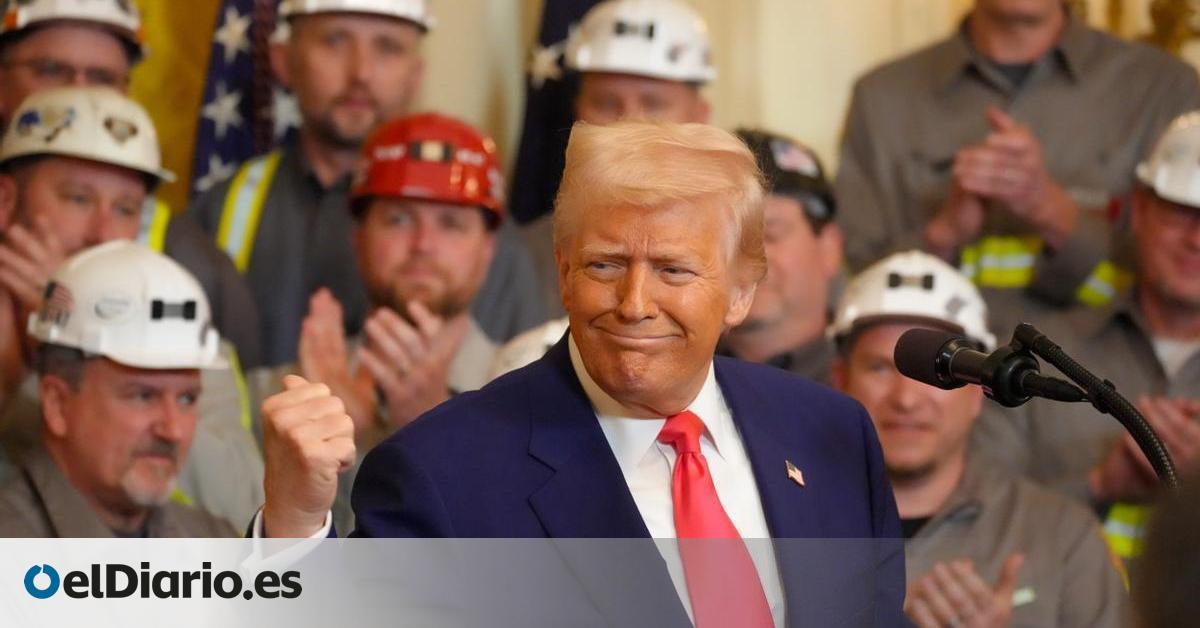
If the US allies know something is that they face the unpredictability of Donald Trump. Its impulsive and chaotic leadership leads to powers such as the EU, the United Kingdom or Canada to be on alert, no matter how much the brake on the commercial war pressed by the markets and even voices within its own administration. The three -month tariff truce has given governments a respite, which see a window of opportunity open to negotiation. But distrust of Trump perseveres.
The EU has made several gestures of goodwill to Trump. The last one has been the suspension for three months of the tariffs with which he was going to respond to a part of the blow that has arrived from Washington (25% of aluminum and steel, which is still in force). Therefore, 92,000 million euros in EU exports – which include cars, which also have a 25%tariff – will remain without retaliation. At least for now, because the misgivings towards the Republican leader were reflected the statement of the president of the European Commission, Ursula von der Leyen, in which it makes clear that if there is no agreement, the countermeasures will be reintroduced and also that in Brussels they continue working in the global response if the conversations fail: “All options follow on the table”.
“This changes day by day, time by time. At this point I will not speculate with what it could or may not happen after 90 days,” said the spokesman for commerce, Olof Gill, what would happen in case there was no agreement. “I am more worried about what can happen in 90 minutes,” he added with a sneer. And it is that Trump gave a flying just hours after the EU was approved the first tariffs in response to his commercial war.
“After these stressful days, we have this respite, which is very important because 90 days allow us to elaborate more strategies and have better prepared solutions. So that’s why I am very better humor than yesterday, but obviously the situation is extremely serious and is just a brief respite,” said a high community source on Thursday. The Ministers of Economy will hold an informal meeting in Warsaw on Friday in which they were going to set the strategy against the US, but the waters are calmer.
“In the EU we are at the moment in Buddha’s mood: we are observing carefully, analyzing the situation and preparing a meticulous response, but without exaggeration,” added that same source, which admitted that the spiral of tariff belligerence in which Washington and Beijing have fallen is not good news, no matter how much the crisis between the EU and the US has softened.
Stock market chaos
And it is that uncertainty is not a good counselor and threatens the global economy with entering a slippery terrain. This has been demonstrated by the financial markets in the last hours after the collapse of 19 billion dollars in capitalization suffered from the first Trump tariff shots.
The euphoria with which Wall Street closed on Wednesday, after Trump announced the tariff truce, had already cooled this Thursday morning. The stock market indicators opened down and, after the president intensified his commercial war against China, collapsed again: the S&P500 closed leaving more than 3.4%; and the Nasdaq, 4.3%. Despite the relief that it represents for the US economy, the 90 -day break of the encumbrances is not enough to restore the lost stability of the markets.
Trump, who during the cabinet meeting this Thursday has assured that Wednesday was “the biggest day in history” markets, has avoided ruling on the fall of the bags in the imposition of 145% of tariffs to China: “Well I have not seen it because I have been gathered here for two hours. Do you want to say something Scot?” The Republican has passed the hot potato to his Treasury Secretary, Scott Besent, who has minimized the facts. The Republican continues to insist on the success of its commercial policy, although the fears of a recession continue to float in the air.
The former president of the United States Federal Reserve, Janet Yellen, warned this Thursday morning in the CNN that the constant bands in commercial policies have increased the possibilities that the country enters recession. The scenario, which already shuffled the company JP Morgan from the “Day of Liberation”, is still on the table, according to Yellen. Who was also a Treasury secretary during the administration of Joe Biden has stressed that tariffs on Chinese goods will have “a massive impact on the United States and the global economy.” “No one knows where these policies are focused,” he said.
Although at the Trump Cabinet meeting he has not made any more comments on the future of the commercial climbing with China, on Wednesday the secretary of the Treasury left the door open to an agreement. “Everything is on the table,” said Besent.
Tension between the two great powers
Last year it is estimated that the United States imported about 440,000 million from China, while the Asian giant only had an expense of 145,000 million in US imports. The commercial deficit for 2024 was 295,000 million dollars, being a considerable figure that is equivalent to about 1% of the US economy. Together, the United States and China together represent more than 40% of the world economy. A commercial war of the magnitudes that Trump is leading has the same potential to lead the country to a crisis as the total tariff war that initially planned.
While the commercial war progresses, some of the great American companies have already started canceling orders made in China. Amazon, the Jeff Bezos online trade giant, has been suspending orders of scooters, air conditioners, beach chairs and other products from several sellers based in China and other Asian countries, Bloomberg reported Wednesday. The cancellations occurred after Trump’s initial announcement in which he exhibited his tariff table at Rose Garden last week.
The rise on Thursday to Chinese tariffs is the fourth announced by Trump in just one week. When last Wednesday (the “day of liberation”) the president showed his rate of fees, China was 34%. But after China said that he did not plan to reverse the tariff war, the tycoon raised the figure to 84%. On Tuesday, when Beijing was still not yielding and announced that it would apply the same figure, 84%, to US imports, Trump climbed the bet and climb it to 125%. And this Thursday has been disadvantaged to move to 145%. Beijing has continued carrying the US administration and Chinese exterior spokesman, Lin Jian, has accused her of “seriously violating the norms of the World Trade Organization (WTO).”
The EU approaches China
Meanwhile, the EU continues to accelerate in its diversification strategy by opening new markets. And that includes China, a country with which progress is being produced, although in Brussels they treat them with discretion. The Commissioner of Commerce, Maros Sefcovic, has agreed with his Chinese counterpart, Wang Wentao, to study the imposition of minimum prices to the importation of electric cars manufactured in the Asian giant instead of the tariffs that the EU imposed in the month of October.
This same Thursday, in a phone call, von der Leyen, and the president of the United Arab Emirates (EAU), Sheikh Mohamed Bin Zayed al Nahyan, agreed to initiate negotiations on a free trade agreement: “This agreement will reinforce our bilateral relations and contribute to the prosperity of the entire region.” The German also transferred to the Prime Minister of New Zealand, Christopher Luxon, her interest in achieving “narrower” commercial cooperation with the twelve countries that make up the comprehensive and progressive transpacific agreement of Economic Cooperation (CPTPP), which includes Australia, Japan, Canada, Malaysia or Vietnam.
Source: www.eldiario.es

